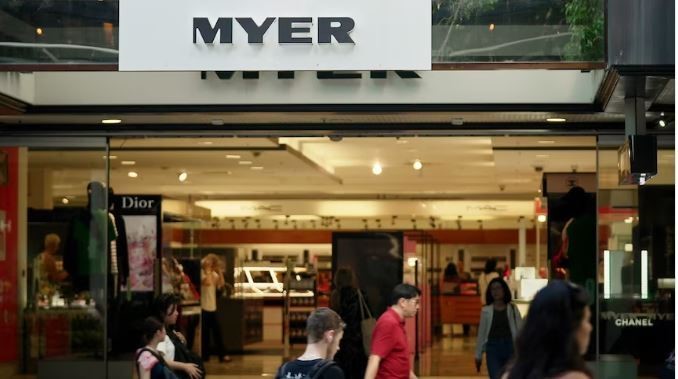Markets are widely predicting another interest rate rise ahead of tomorrow's RBA board meeting, while the ASX has closed higher on its first day of trade for the week, after a US debt ceiling deal was signed into law by US President Joe Biden.
It follows the Australian consumer watchdog taking aim at the airline industry, saying a lack of competition is driving up airfares and resulting in poorer service.
Look back on the day's financial news and insights from our specialist business reporters on our blog.
Disclaimer: this blog is not intended as investment advice.
Key events
Live updates
How the market finished at 4:10pm AEST
By Kate Ainsworth
-
Australian dollar: -0.1% at 66.02 US cents
- ASX 200: +1.0% to 7216.30 points
- All Ordinaries: +1% to 7401.20 points
- S&P 500 (Friday): +1.5% to 4,282 points
- Nasdaq (Friday): +1% to 13,240 points
- FTSE (Friday): +1.6% to 7,607 points
- EuroStoxx (Friday): +1.5% to 4323 points
- Spot gold: -0.2% to $US1,943/ounce
- Brent crude: +1% to $US76.84/barrel
- Iron ore: +2% to $US104.15/tonne
- Bitcoin: -1.3% to $US26,831
ASX finishes higher as iron ore hits two-week high
By Kate Ainsworth
The Australian share market has closed a full per cent higher today, up 71.2 points to finish at 7,216.30 for Monday.
The solid day of trade was helped thanks to renewed security out of the US where the debt ceiling suspension has come into act over the weekend, boosting overall optimism in the global markets as the risk of a default is minimised.
Looking at the sectors, academic and educational services gained the most, up 3.9% at the close of trade, while consumer cyclicals was up 1.8% and basic materials jumped by 1.4%.
Technology and utilities fell slightly, by 0.1% each.
The top five performers for the day were:
- BrainChip Holdings +5.8%
- Lovisa Holdings +5.5%
- Bapcor +5.5%
- NRW Holdings +5%
- Pro Medicus +4.9%
At the other end, the bottom five performers were:
- Capricorn Metals -4.6%
- Silver Lake Resources -3.9%
- Sayona Mining -2.6%
- Perseus Mining -2.6%
- Newcrest Mining -2%
But it wasn't all bad for commodities — iron ore reached a two-week high amid speculation that there will be an increase in demand for steel out of China.
Meanwhile oil prices also rose after Saudi Arabia pledged it would make big cuts to its output, down to 9 million barrels per day in July, down from 10 millions barrels per day in May — making it the biggest reduction in years.
And that brings today's blog to a close — but we'll be back to do it all again tomorrow, when we'll learn what the RBA chooses to do with interest rates at its board meeting tomorrow.
Until then, you can catch up on today's developments below, or download the ABC News app and subscribe to our range of news alerts for the latest news.
Profit growth slows as wages growth takes off
By Michael Janda
It seems that the pendulum has finally started turning between profits and wages, with business earnings up a meek 0.5% in the first quarter, while wages and salaries rose 1.8%.
Things weren't quite as subdued as they look for most businesses though, with a 2.2 per cent slide in mining profits on the back of falling commodity prices more than offset by a 3.3 per cent jump for non-mining industries.
"Of the non mining industries, professional and businesses services (our grouping of ABS data) was the biggest contributor to the strong result with profits up by 6.5% in the quarter," wrote CBA economist Stephen Wu.
"Also providing a solid boost was transport (+10.1%), manufacturing (+5.0%) and construction (+2.9%)."
Perhaps the construction industry's "profitless boom" is finally coming to an end? Although it's likely the second word in that phrase, "boom", is also likely to end shortly with residential building approvals tumbling to decade lows.
But, while many businesses continued to increase earnings, those reliant on more discretionary consumer spending seem to be coming off the post-COVID boil.
"In addition to mining, profits in wholesale trade ( 4.5%), retail trade ( 2.1%) and accommodation and food services ( 14.0%) saw falls in the quarter," added Mr Wu.
"These three industries are reliant on consumer spending and may point to emerging weakness.
"Delving a little deeper into the 'other' category that we report on, profits in the recreation industry were down by 7.9% in the quarter."
This may also be reflected in rising inventories, which are going to add to economic growth in the first quarter but can be a sign of weakness if they are the result of lower than expected sales.
"Wholesale trade and accommodation & food services inventories are well above their average stock levels in 2019 (+13, 15%). Retail trade inventory is close to its 2019 average levels," observed Mr Wu.
The 1.8% March quarter rise in the ABS measure of wages and salaries was much stronger than the 0.8% increase in the wage price index for the same period.
The difference is that the broader measure published today captures the effects of population growth (more people working more hours), promotions, pay rises from changing roles or employers, and bonuses.
"The biggest rise in wages paid came in education (+4.4%). Also recording solid growth was health (+3.3%), information technology (+3.2%) and utilities (+2.1%)," wrote Mr Wu from CBA.
"Real estate services was the only industry to record negative growth in the quarter, down 0.4%."
I can just see your tears falling for the real estate agents who saw their commissions drop amid low levels of listings and sales over the first quarter.
Overall, over the past year, the amount of money going to workers was up 11.4%, although this still fell short of the 14% increase in profits economy-wide over the same period.
Coles and Woolworths accused of setting up 'foreign' pay system to rip off workers
By Kate Ainsworth
The Federal Court has heard that Coles and Woolworths short-changed workers on overtime by setting up a payment structure that was foreign to Australia's industrial awards system.
The supermarket giants are in court after joint trial was brought by the Fair Work Ombudsman and two class action claimants, alleging that workers have been underpaid for a number of years.
In his opening address, Fair Work Ombudsman barrister Justin Bourke KC argued the "entirely foreign" payment structure covering some workers would always "end badly for Woolworths and Coles and its employees".
He took Justice Nye Perram to the relevant award, arguing work hours were set at a total of 38 rostered hours per week, before contending that was not what happened in reality.
In an "extreme" example, Mr Bourke said one team manager in Sydney was working 13 hours a day.
Other workers were doing average shifts of nearly 11 hours, he said.
He said evidence would show clear standards had to be met by the companies, and that there was tacit approval of the alleged illegal conduct, submitting they knew people were working above rostered hours "day in day out".
There were failures on the use of "informal" rosters, time off in lieu, and record keeping on worker overtime, penalties and allowances, he said.
"No one blew a whistle," Mr Bourke said.
"They knew it was going on and they have to pay for it."
The trial is expected to run for seven weeks.

Class action launched against AGL over alleged competition law breaches
By Kate Ainsworth
AGL Energy Limited has been served with class action proceedings relating to part of its National Energy Market (NEM) operations.
The proceedings allege breaches of the Competition and Consumer Act in relation to bidding in the South Australian region of the NEM.
The NEM covers Australia's eastern and south-eastern states, with five physically connected regions — Queensland, New South Wales (which includes the ACT), Victoria, Tasmania and South Australia.
In an announcement to the ASX, AGL said it took its "compliance obligations seriously and intends to vigorously defend the proceedings".
The class action comes in the wake of broader discussion about the energy market, with prices going up significantly, and an unprecedented federal government-backed intervention in the market last year.
You can keep reading this story from Jessica Warriner below:
What's happening in the Australian economy? A mega global bank has a mixed view
By Daniel Ziffer
Analysts at J.P. Morgan have given their judgement on our local economy and it's an 'as we expected'.
Essentially, data from businesses supports what the bank thought would happen in the first quarter of this year.
"Mining profits downshifted most in terms of weighted contribution to total profits, though most sectors eased in either growth or absolute terms."
But it's very lumpy, very different across different parts of the economy. All these figures are 'quarter on quarter' - from the last quarter of 'September to the end of the December' compared to 'January to March'.
- Overall: +0.5%
-
Retail: -2.1%
-
Accommodation and food services: -14%
But it described the sector data as "very whippy", meaning it moves around a lot. For example, in the three months before, accommodation and food services was +16.7 per cent.
The sector-level profit data are very whippy so we wouldn't over-extrapolate the swing, though the details are certainly consistent with policy gaining traction and reducing nominal spending.
Market snapshot at 12.30 AEST
By Daniel Ziffer
Here's how the market is looking just after midday.
-
Australian dollar: -0.15% at 66.01 US cents
- ASX 200: +1.1% to 7223.10 points
- All Ordinaries: +1% to 7408.30 points
- S&P 500 (Friday): +1.5% to 4,282 points
- Nasdaq (Friday): +1% to 13,240 points
- FTSE (Friday): +1.6% to 7,607 points
- EuroStoxx (Friday): +1.5% to 4323 points
- Spot gold: -0.1% to $US1,944/ounce
- Brent crude: +0.1% to $US75.64/barrel
- Iron ore: +2% to $US104.15/tonne
- Bitcoin: -0.3% to $AU41,014
Interest rate pain likely to increase tomorrow
By Daniel Ziffer
Are interest rates really going up AGAIN? Please don't increase them any more, I can't pay any more, this is killing me.
- Andy
Sorry Andy, and other borrowers out there.
Markets are tipping rates to increase again at tomorrow's meeting of the Reserve Bank board.
Visit the business team blog and the ABC News Channel for full analysis all day, and after the decision at 2.30pm.
ASX up more than one per cent at lunch
By Daniel Ziffer
Trading in the key ASX 200 index is up 1.1 per cent at midday, and Australia's biggest three biggest companies are enjoying the gains.
- BHP up 1.5 per cent to $43.90
- Blood products maker CSL up 0.9 per cent to $310.91
- Commonwealth Bank up 0.8 per cent to $97.76
Of the 200 companies in the index, 166 are up in value, 5 are stable and 29 have fallen.
BrainChip Holdings is the big mover, stocks in the AI company soaring 11.5 per cent in morning trade after it announced a partnership with a US firm to use the firm's technology in devices that receive and broadcast radio.
Sounds very old-school - at a time when new some cars are being delivered without radios - but the uses include fields like astronomy, navigation and aerospace.
Shares in BrainChip have been as high as $1.36 and as low as 35-cents in the past year. Up more than 10 per cent today it's currently trading at 48-cents.
PwC scandal - still confused?
By Daniel Ziffer
Thanks for all your lovely comments about Kate's great and comprehensive explainer on the scandal at consulting firm PwC - and why it's not over by a long shot.
If you're on TikTok, the ABC News team has an explainer there too. You can see me walk and talk At The Same Time as I get you through this developing issue.
Market up 1.1% at 11.30am AEST
By Daniel Ziffer
The ASX is up 1.1 per cent in morning trade to 7,224.80 points.
The index tracks the value of the 200 largest companies listed on the Australia stock exchange (ASX).
AI stock BrainChip is the top mover today, reflecting a lot of what's been happening in the US market - where companies exposed (in a good way) to the potential of artificial intelligence have roared all year.
Competition watchdog pushes airlines on cancelled flights
By Daniel Ziffer
If you ever had a flight cancelled for reasons unrelated to safety or weather you've probably been annoyed... and unable to do anything about it.
The competition watchdog - the ACCC - says it's not good enough, and wants the Federal Government to think about potential compensation under law.
Got a home loan? Look away now
By Daniel Ziffer
Tomorrow's the board of the Reserve Bank will meet.
They set the cash rate that banks use to settle debts with each other overnight. That rate also helps set the percentage of interest charged to variable loans - notably mortgages.
If you're in the one-third of Australians with a home loan, or the one-third who rent where they live (many of those dwellings having landlords who are also paying a loan on the property) you're not going to enjoy this frank assessment of where things are going from Deutcshe Bank.

Up. Things are going up.
DB change in RBA call: new terminal rate of 4.6 per cent by September, previously 4.1 per cent by August. The current cash rate is 3.85 per cent%, we expect 25 basis point hikes in June (i.e. tomorrow), August and September.
It now sees three rate hikes in the next four months, starting tomorrow.
In January the bank made the call that it saw cash rate of 4.1 per cent as the likely top for the RBA. (It uses the term 'terminal rate' which essentially means the rate at which the central bank is happy and the economy works okay).
At the time Deutsche Bank's model said the rate should be 4.5 per cent but the bank didn't back it, going out with a lower prediction.
That was wrong.
"We fell short of taking our rules-based policy prescription entirely at face value, arguing instead for a terminal rate of 4.1% (which was still significantly higher than market pricing at the time). In hindsight, it seems we should have placed more faith in our model. Increasingly, it looks like it was right all along".
So, essentially, AI will take our jobs and mortgages are set to keep rocketing.
Iron ore rollercoaster
By Daniel Ziffer
I'm assuming iron ore is NOT -$106.33 a tonne 🤔
- Justin
Thanks to Justin for picking up on a rogue negative sign on my opening snapshot which, when you put it in talking marks like this '-' does look like a confused smiley face.
No, the price of a tonne of iron ore isn't negative US$106! People desperately want our magic steel-making rocks.
Iron ore prices continue what has been a wild ride this year. It's not just key miners like BHP and Rio Tinto that ride on it's back, the Treasury gets a lot of receipts from it too - one of the key reasons the Government promises our first budget surplus since the GFC back in 2008.
Myer boss fixes company, heads home
By Daniel Ziffer
The chief executive of retailer Myers is stepping down after a turbulent fives years that saw the company shut stores, sack workers and turn-around what was a faltering network of stores.

John King will return to the US in the second half of the year, the company has announced to the stock exchange.
When he arrived Myer has just lost $486 million for the 2018 financial year. That's turned around to a $65 million profit last year.
It has 11 per cent less space than it did when he started, because it's shut under-performing stores and trimmed the space at others.
Myer missed the shift to online that other retailers jumped on to and by 2018 made $208 million from online revenue. As Mr King leaves, it was $722 million last financial year.
Unresolved is the company's frenemy relationship with it's largest shareholder Solomon Lew.
He holds more than a quarter of the stock, as well as running retail brands like Smiggle and Peter Alexander and has been at times vocal about the direction of the company.
Arrears rising, might break through long-term average despite high employment
By Daniel Ziffer
At the start of most 'alien invasion' films, there's a bit where the heroes are driving in a car and listening to the radio.
As the song ends there's a short news headline, something like: "Scientists are concerned about unusual activity in the atmosphere that's causing strange cloud formations..."
It's a little warning that things are happening.

In the world - where people's lives, economics and money collide - 'arrears' is that warning. It's the rates at which people are behind on their loans, credit cards and commitments.
It's not everything, but it's a signal of rising heat and trouble. New data from S&P Global Ratings has arrears for home loans "nudging higher" as the hurdles to refinancing grow.
(RMBS or 'residential mortgage-backed securities' are essentially loans for residential properties that are being paid back)
“Investor arrears across both the prime and nonconforming RMBS sector are 1.06% as of March 2023, compared with 1.40% for owner-occupiers. We anticipate owner-occupier arrears will continue to increase at a faster rate than investor arrears, given the higher income profile of many investors and the ability to offset higher mortgage repayments against strong rental price growth due to low vacancy rates.”
Translation: Investors have more money and can lift rents to meet the need to pay high loan repayments. Home 'owners' can't.
Could timber troubles be cleared up with cannabis?
By Daniel Ziffer
Something a bit different that's being looked at where I grew up, in Victoria's beautiful Gippsland region.
After decades of controversy, the timber industry is close to collapse. A State Government decision (pushed by several court rulings) will see native logging end this year.
Economically and socially, this will have a devastating impact on a lot of communities in the region - to the east of Melbourne.
There are no quick solutions to build viable jobs and industries in the area. Like the demise of the coal-fired power industry in the Latrobe Valley (next door) it's likely to involve two things:
- Massive amounts of money from state and federal governments
- A broader array of industries to offset the loss of one key one
Advocates of hemp growing hail the "stigmatised" crop as an option, with the crop able to be turned into a range of building materals.
My colleague Fiona Broom has the story.
RBA rates set to rise, markets suggest
By Daniel Ziffer
Interest rates will lift tomorrow, markets suggest.
80% of economists surveyed see it lifting.
The board of the Reserve Bank meets tomorrow and interest rates will be high on the agenda.
The cash rate is currently 3.85%, it went up 0.25 points - the 11th lift since May last year.
ANZ chief economist Richard Yetsenga has lifted the 'top' of where the bank sees rates getting to. People with home loans won't enjoy what he's suggesting.
We have moved our expectation of the terminal RBA cash rate to 4.35%, as we no longer see 4.1% as sufficient to bring inflation back to the target in a reasonable period of time. An important element of this story is the resilience of the Australian household sector. Data this week, including monthly CPI, also point to higher interest rates soon.
Will AI take your job?
By Daniel Ziffer
It's okay to be worried that artificial intelligence (AI) might take your job.
Automation and algorithms have long threatened repetitive jobs that deal with information.
But it's more likely to be a bit of both: employees palming off boring and repetitive aspects of their job to AI as much as it's about changing or restructuring roles.
Check out Rachel Pupazzoni's detailed and nuanced look at the field, which includes this chart about the most-likely jobs to be in trouble.
Top 10 jobs likely to be impacted by generative AI:
- 1.Telemarketers
- 2.Tertiary educators
- 3.Social professionals, e.g. interpreters
- 4.Intelligence and policy analysts
- 5.Judges and their clerks
- 6.Counsellors
- 7.Purchasing and supply logistics clerks
- 8.Human resource professionals
- 9.Management analysts
- 10.Insurance and betting clerks
Source: Mandala
It's okay if you 'don't get' the PwC scandal - we've broken it down for you
By Daniel Ziffer
Expect more news this week about the PwC scandal, when questions are asked at a Senate hearing on Wednesday.
The turmoil at the consulting firm has been going since January, but it's okay if you're not across it. My colleague Kate Ainsworth has written a great explainer that even tells you what a consulting firm is and does.
Check it out!











